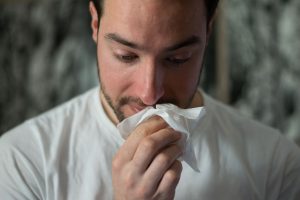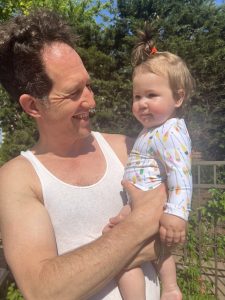Men’s Health
How Much Sex is Healthy?
 Not a frequently addressed subject in western medicine, most likely mostly because they don’t have a strong point of view, possibly also due to society’s repression on the matter. Is sex healthy, and if so, how often?
Not a frequently addressed subject in western medicine, most likely mostly because they don’t have a strong point of view, possibly also due to society’s repression on the matter. Is sex healthy, and if so, how often?
Generally, the answer is yes, sex is healthy, although most of us have heard stories of people—usually men—going into cardiac arrest and dying in the act. Much more common is the experience, also predominantly for men, of feeling exhausted or depleted immediately following. The French nickname the orgasm, le petit morte, or “little death.” The Chinese believe our “jing,” or fundamental physiological essence is stored within ejaculatory fluids, especially those of men. Supposedly women’s jing is stored more in placental fluids and lost through pregnancy and childbirth. Yet I have never heard a medical professional, beyond my own colleagues and teachers, discuss the issue.
Supposedly, up until our mid-20’s we have a relatively unlimited reserve of “jing,” and afterwards, we should be more mindful of how much we expend. I can’t relay a one-size-fits-all rule, but based on what I’ve read, in our thirties a few times a week is considered healthy, in our forties and fifties about once a week, and a maximum of a few times per month in our sixties and beyond. Any more would expend too much—any less could create stasis in the urogenital microbiome, which could send inflammatory heat upwards to the central nervous system. In other words, extended dry spells create stress. Overindulgence creates weakness.
Supposedly, sex is healthier than masturbation, first because of how supportive it is for the psyche, and how the “fire element” of the mind and heart balances the “water element” of our kidneys, or adrenal health. In theory, depletion of the latter might explain why overexcitement of the former can be the final straw to cardiac arrest. Secondly, although in the process men lose jing no matter what, it is hypothesized that by absorbing their partner’s genital fluids, jing is supplemented. There are ancient Taoist practices of men withholding their ejaculation or ejaculating “internally” to conserve, though this is not advisable in my opinion, without proper guidance and instruction.
According to the circadian clock of Chinese medicine, the optimum time to have sex is in the window of the pericardium, from 7-9pm, which would make the least healthy time between 7-9am, which is generally not a problem for people with small children. Besides the “ministerial fire of the pericardium” being weaker in the morning, most of us would have to still pursue our day’s activities sans the healthy physiological fluids we are intended to transform into cellular energy. In moderation, it’s probably fine. To mitigate the “side effects” of morning sex we might recommend taking it as easy as possible, consuming eggs and animal protein, and staying hydrated. Another potentially ideal time could be between 5-7pm, which corresponds to the kidneys, whose qi is largely responsible for our sexual health. Any time in the evening offers the virtue of rest following the act.
Don’t get me wrong. I don’t believe we are meant to have much jing left when we die—in fact its complete desertion is considered the cause of death when biomedicine cites: “natural causes.” I believe in “leaving it all,” as they say in sports, as jing is expended not only through sexual activity, but through all our worldly pursuits and great effort in life. However, signs of premature “jing deficiency” usually pertain to the brain and bones, or any manifestation of looking older than one’s age. Neurological diseases, osteoporosis, loss of hair or its color in our twenties might all point to jing vacuity. I hope this provided some interesting insight in a realm where almost no clinicians do.
Refuting the “Man Cold” Cliche

Well, if Covid and seasonal allergies had a lovechild its name would apparently be the upper respiratory pathogens of Winter, 2023. I experienced both personally and professionally, not only the severity of these viruses’ symptoms, but maybe even more troubling was how stubborn they were to resolve. Coughs that would linger for weeks on end, allergies turned to sinus infections, and one friend had the shingles virus transform into a vicious cough, which in my humble opinion occurred because he didn’t properly treat the former with Chinese Medicine.
I am grateful we seem to be passing simultaneously, likely not coincidentally, out of this post-pandemic ripple effect along with the cold weather. Besides dilating the blood vessels of our respiratory microbiomes, thereby giving pathogens wider exit pathways, the warm air should eventually aid in transforming latent mucus and boosting our metabolic energies enough to in turn boost our immunological energies, or “wei qi.”
I plead ignorance, in the past few years more than ever, to most current events, trends on social media, philosophical platitudes, and pop culture; and I often question whether that makes me an “ignorant person”—especially since we will all eventually die still relatively ignorant about most things and peoples. Besides my family, I devote most of my time and mental energy to Chinese Medicine. Whatever is left over at the end of each day are mere scraps, an hour or two at most, and I choose to shut my mind off with friends and/or sports. Maybe in another chapter of my life I’ll read more articles and keep up with external themes and events.
Before blowing my own nose about 50 times a day one week back in January, my lungs exacerbated by the need to rid themselves of phlegm, I had never heard of “the man cold.” Apparently, amongst the infinite social media cliches is one that guys are overly dramatic or whiney about their common colds, obviously underscoring “girl power,” which is a great thing, but also the idea that men are weak(er), which might not be great, or accurate.
Recall the first wave of Covid, we were quickly informed that men, along with the elderly and obese, were most susceptible to severe infections. Why? Well, from a Chinese Medical perspective men have more heat and/or yang qi in the body’s upper region. On one hand it is why we are fortunate enough to have generally more energy. It is consistent with our generally superior upper body strength; though it is also why the inflammatory cytokine response is more intense in the context of upper respiratory viruses.
If you require this be translated in conventional medical terms—and most westerners do—as a result of our increased testosterone and androgens, men possess higher numbers of T cells and Natural Killer cells than women, whereas women have greater B cells, neutrophils and phagocytic activity, which makes them more adept at clearing viruses, as well as the toxins from vaccines. Women also have a greater susceptibility to dysregulation of innate lymphoid cells, which makes them generally more prone to autoimmune disease. (source: https://www.nature.com/articles/nri.2016.90.pdf)
Returning to the brilliant simplicity of Chinese Medical jargon: It is the heat from our body’s (masculine) yang qi that provides ample metabolic strength to regulate our lymphoid cells and avoid autoimmune disease. It is that same heat, left uncontrolled, that creates a more inflammatory cytokine storm in the lungs and makes clearing external pathogens more stubborn. It’s not because your husband is being a little bitch.
Father’s Day, from a Chinese Medical Perspective

In celebration of my first Father’s Day as a father I couldn’t help but reflect on when and why I first decided that I wanted to have children. As an exorbitantly self-absorbed, 20-year-old, male urbanite with artistic passions and lofty career goals, I never thought about having kids. I don’t know that I defiantly didn’t want a baby—nor did I consciously want one. It wasn’t until approximately a decade later, upon my initial explorations into Buddhism and spiritual literature that I decided procreation mattered to me.
Parenthood, in my opinion, represented an important experience towards self-actualization. Like most young adults I developed aspirations to give to my future child an even richer and more complete experience than was given to me, which I’m confident my own parents succeeded in providing relative to their upbringings. I think most of my generation were brought up with greater affection and career opportunities than the previous generation. My hope is to bring my daughter up with a greater cultural experience and spiritual awareness, and of course a more conscious diet.
I entered parenthood with these naïve notions, images of sitting lotus posture across from my child, our eyes locked as I imparted fortune cookie wisdoms to her, until we spontaneously merge into an exploding ball of white light and love. Instead, my experience is closer to that of an unpaid employee at a 2-star restaurant, who frantically wears the hats of chef, dishwasher, busboy, and maintenance man, while shouting back and forth at my “co-worker” anything but pieces of fortune cookie wisdoms. I am aware of course, as I sit here typing this, that these are the “spiritual experiences” in action that I sought. Though it is admittedly beyond challenging in those moments to recognize them as such, or to understand what it means to be a father.
With all due respect to the modern mutability of gender roles, identifications, and definitions, when I think of a father I think of my own dad, the masculine energy, or “yang qi” of the body. In Chinese Medicine our first line of immunological defense are the “tai yang” (or “greater yang”) channels. It is the job of the yang qi to protect and warm us, also to motivate and excite us, and direct us upwards… which may be why my daughter prefers that I lift her up towards the ceiling to kick her legs and laugh, but insists with no equivocation that she always be put down to sleep by the calmer, more nourishing, “yin energy” of Mom.
While my own father was a paternal treasure, an awesome dad five times over, where I saw his “yang qi” finally falter in his later years was in the all too common indulgences of “pathological yin” substances: Sugar, alcohol, cold foods and drinks, a sedentary and relatively anti-social lifestyle over time will put out our yang fire, and too often in our society what we see in older dads are soft, curvy, and fleshier physiques concurrent with quiet, more withdrawn demeanors. While some degree of grounded calm is very organic in our later years, my opinion and observation is that there can be a healthier, more engaged manifestation of it.
Without much apparent choice in the matter, my intention is to continue grinding away in the 2-star restaurant, hopefully with perpetually greater mindfulness that every sleepless night, every screaming cry, and scrubbing session on my hands and knees of the cooked produce peppered around our living room floor is the spiritual experience. With hopes that one day through my own appropriate discipline and self-care, I’ll possess adequate yang qi by which to sit lotus across from Peyton, look into her eyes, and impart everything I know, and don’t know.
Happy Father’s Day!


